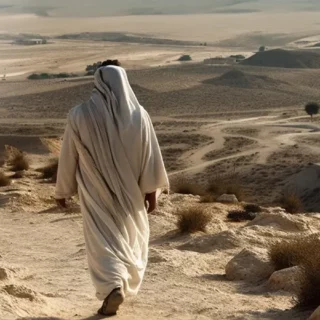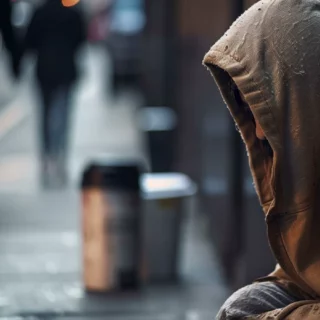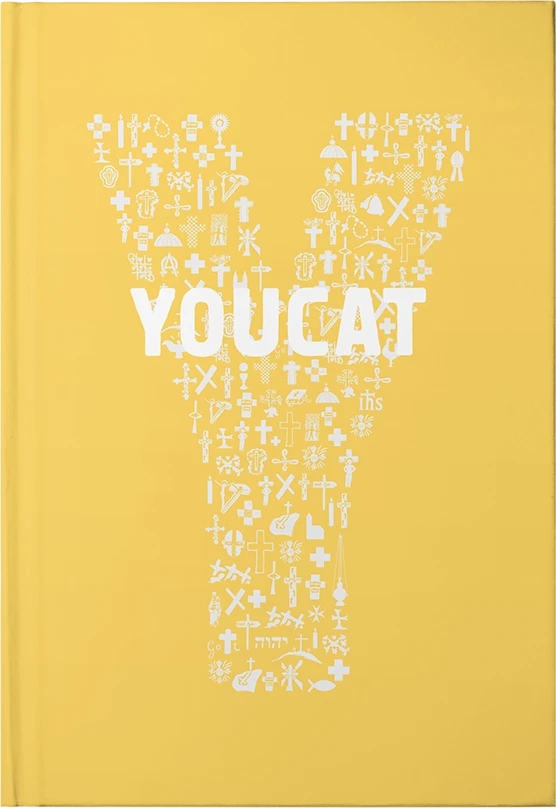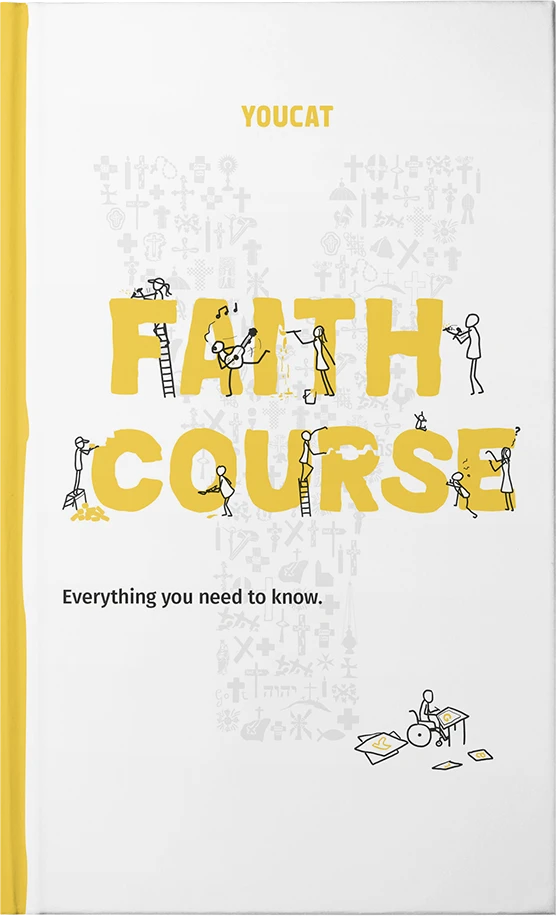

Credopedia
How should I act as a Christian in a crisis?
How should I act as a Christian in a crisis? Faith, prayer, and hope. An overview of important passages from the Bible and the catechism.
Definition
Crisis
A crisis is a dramatic peak of a situation which an insecure outcome. A crisis can escalate and turn into a catastrophe, but also turn into a chance for a new beginning. The word “crisis” originates in the Greek word “krinein” and means to separate or differentiate.
What does the Holy Bible say?
The story of the people of Israel is one of existential challenges and threats, which is reflected upon through the light of God’s perspective. The God of the Bible is a God who sees (Ps 94:9 He who planted the ear, does he not hear? He who formed the eye, does he not see?), cares (1 Pet 5:7 Cast all your anxieties on him, because he cares for your) and who acts (Ex 20:2 I am the Lord your God, who brought you out of the land of Egypt, out of the house of slavery). The great challenges Israel faces (Exodus, Babylonian Captivity, Book Job) require the free decision and co-work of men who are supposed to learn from history and discover God working in it: “I will instruct you and teach you in the way you should go; I will counsel you with my eye upon you.” (Ps 32:8)
Jesus was also familiar with “crises” which led to new beginnings. In the gospel of Mark (Mk 8:27-9:1) we find the account of a Galilean crisis. In the area of Caesarea Philippi Jesus is first surrounded by crowds through his public appearance, but the majority of people do not end up following him, but instead animosity and lack of understanding mounts. This is also when Jesus turns towards the cross “Do you want to go as well?” (Jn 6:67). During the night at the Mount of Olives Jesus talks to his father in great anguish to finally break out of his crisis in his decision to trust: “My Father, if it is possible, let this cup pass from me; nevertheless, not as I will, but as you will.” (Mt 26:39). God’s dealing with the crisis is clearly shown through the resurrection of Christ: While the disciples on their way to Emmaus are still focussed upon the catastrophe (Lk 24:21 “But we had hoped that he was the one to redeem Israel.”) the Lord is already accompanying them towards something very new!
A short YOUCAT-Catechesis
How am I supposed to act in a crisis with an uncertain outcome as a Christian?
Christians are not a special, invincible creation of God. Christians are ordinary people, just like everyone else. They feel very weak at times and get scared, panic, and sometimes get completely lost. But if they do have one thing in common, it is their strategy for survival. And they cannot take credit for it. They learn what to do in a crisis from he who sits with them in their boat, onto which the waves are crashing. “Why,” Jesus asks, “are you so afraid? Do you not have faith?” And suddenly there is silence in the midst of the storm.
Do you not have faith?
I found this kind of faith and peace of mind in the midst of a crisis with a young woman, who may or may not have been a professing Christian. When a young Jew named Etty Hillesum was transported from a concentration camp in Holland to Auschwitz-Birkenau, she found time to throw out a postcard from the carriage. Farmers found it and picked it up. On it was written “I open up the Bible to a random place and find: The Lord is my fortress. I am sitting in an overcrowded carriage on my backpack. Father, Mother, and Mischa are a few carriages away from me… We left the camp singing, father and mother are at peace and couragious.”
A friend of this young woman, who did not grow up with faith, had recomended to her a few years back to start reading the Bible. Furthermore, she had recommended Augustine, Thomas a Kempis, and Eckhart. Shortly before her deportation, she noted in her diary: “There are truly people who hide their vacuum cleaner and their cutlery shortly before being deported, instead of securing you, my God. And there are people who only want to save their bodies which are nothing else but a home for a myriad of fears and troubles. And they say: They must not get me! And they forget that nobody can get you, if one stays in your arms.”
When everything falls apart and fades away…
Many people feel shaken up by Corona, even to their core of their existence, experiencing it as something in which all of their foundations are breaking apart. And in many ways they are right: Health, Economy, Travel, Finances, Life-Planning, and Wealth are fading away. No one knows what this world will look like after Corona. But still you have to say: The real question of survival is not dependent upon this crisis.
The real question is whether there is still something left when it seems like there is nothing.
In truth, there is only one real crisis in the life of a human being, and it is a crisis for which the outcome is known. It will end badly for everyone. We will all die, and this is absolutely certain. It could be in the coming days, weeks, months, or years. Kurt Tucholsky once wrote: Maybe this is the last time you ate kraut. Maybe you spoke to someone on the phone for the last time. Maybe you loved for the last time. Maybe this is the last time you will read Goethe. Maybe many years remain before your death. You don’t know!” We can take a lot of vitamins — it will only help us to realize that even those who die healthy, are dead. (Manfred Lütz)
Like Etty Hillesum, Robert von Arenberg also discovered the inevitable as a resistance fighter in an existential battle of life and death. You might say that he dsicovered the mystery of life-saving communion with God. He put it like this: „They cannot do more than kill me. And even if they do, it will not really kill me.” It’s hard to imagine a more direct response demonstrating belief in God: “Nothing will kill me anymore!”
Is there a vaccine against death?
Yes, the best vaccine against Corona is faith in the living God, in which we have life that no virus can destroy. How does it work? I want to use a visual to expound upon this point. Jesus has allowed himself be „infected“ with the virus of death out of love for us — and he survived. He developed the antidote against death in his blood, through which we can all survive. This antidote is transmitted through blood transfusion. There are these mysterious words from the Gospel of John: “I am the living bread that came down from heaven. Whoever eats this bread will live forever. This bread is my flesh, which I will give for the life of the world.” (Jn 6:51) Even close friends of Jesus were shocked when hearing this — they found it unberable, as it says in John 6,60. Maybe we only need to understand this much for the time being: Jesus shows himself to be our brother in blood, who will go with us through the ups and downs of life, and even through death. In him we have life eternal. For this we need two things: Faith and baptism. („Whoever believes and is baptized will be saved, but whoever does not believe will be condemned.” Mk 16:6) YOUCAT 194 says, “Baptism is the way out of the kingdom of death into life, the gateway to the Church, and the beginning of a lasting communion with God. … Since Baptism is a covenant with God, the individual must say Yes to it.”
We tend to think of baptism as little more than a pleasant occasion, but it opens up the door to a wonderful and safe dwelling place in which we can live in all the sacraments like cozy, splendid rooms. YOUCAT 193 says: “Baptism joins us with Christ. Confirmation gives us his Spirit. The Eucharist unites us with him. Confession reconciles us with Christ. “ It is as if Jesus said: My house is your house!
Christians in the Corona Pandemic
What can Christians — these people who cannot be killed — do in this crisis?
- They can learn to pray and teach others to pray. Etty Hillesum: “I find a deep well inside of me, and inside it, God lives. Sometimes he is unreachable for me, but usually there are rocks and other things in the well, and God is buried.”
- They can get out of the cycle of fear and slavery and open up the door of freedom for others. Working until you break down? What is this good for? For your own career, which destroys your personal relationships? What good is this?
- They can revive the house of God! One Christian is not a true Christian. You need to find others. Where do you find them? Not on the livestream, but in the Church — especially during the celebration of the Eucharist (the union with life itself). If no one anymore summons up the strength for this communal aspect of the life-saving church will be in danger of dissolving.
- They can stand out through remarkable solidarity and caring for others. Being a Christian starts in the family, which must be newly discovered today. Being a Christian radiates in the community. Christians are especially aware of the lonely, the elderly, and for all those who are nearing the margins because they have lost their job, have debts, have no money or are losing perspective and hope. Being a Christian does not stop at the borders of one nation.
- They can infect others with hope. Because they possess something which you cannot buy with money — a miracle that sometimes happened even in the concentration camps. Once more from Etty Hillesum: „When I stand in the corner of the camp, my feet on your earth, and my face lifted towards your heaven, God, then tears are flowing down over my face, because I am moved and touched by gratitude, which is seeking a way out.”

YOUCAT Digital
Discover our digital products, which will help you to grow in faith and become missionaries yourself.







